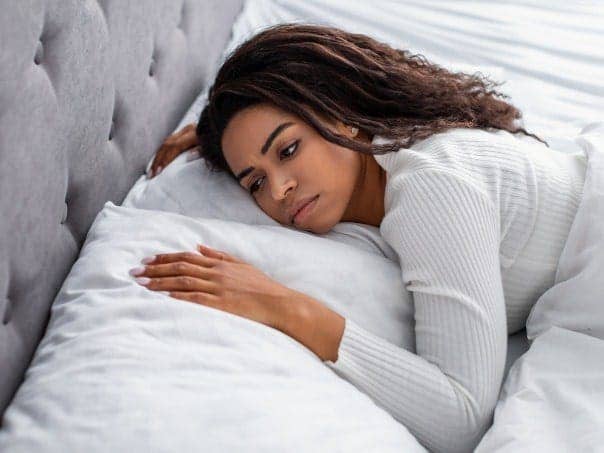Sleep Health
Published February 1, 2022
12 minSleep Deprivation: Causes, Symptoms, Treatment & Prevention
Have you ever had those nights when you tossed and turned throughout but couldn't get a wink of sleep? You must remember waking up groggy and lethargic, with no will to carry out different tasks, and

Table of contents
What Is Sleep Deprivation?Types of Sleep DeprivationHow Is Sleep Deprivation Different From Insomnia?What Causes Sleep Deprivation?How Much Sleep Do You Need?Sleep Deprivation SymptomsEffects of Sleep DeprivationHow Is Sleep Deprivation Diagnosed?How Is Sleep Deprivation Treated?How to Prevent Sleep Deprivation?Frequently Asked Questions
Have you ever had those nights when you tossed and turned throughout but couldn't get a wink of sleep? You must remember waking up groggy and lethargic, with no will to carry out different tasks, and every little thing triggering your mood is due to lack of sleep. This phenomenon named 'sleep deprivation,' and its consequences, like sleep disorders, can be far more harmful than you think. It can easily alter your mental and physical health. By familiarizing yourself with the causes, signs, and symptoms of sleep deprivation, you can prevent the disease from creating havoc in your life.
Not sure which mattress fits you best? Find out now.
What Is Sleep Deprivation?
Sleep deprivation is typically used to refer to when a person does not receive the recommended amount of sleep. This would imply less than 6 to 8 hours for adults and children, below 9 to 10 hours of sleep. As stated by sleep medicine, sleep deprivation is defined as the sleep duration, i.e., the number of hours a person sleeps. But in real life, being well-rested is dictated by something more than just achieving the recommended hours of sleep. So, now the term has more to do with 'feeling refreshed and energized after waking up' than the typical definition. Thus, sleep insufficiency is often used to describe the factors that lead to the state when a person cannot feel rested. For instance, if a person keeps getting up, leading to sleep fragmentation, they technically get the required 8 hours of sleep, but it is insufficient to keep them full of energy. However, the term has become generalized and, in everyday conversation, is used to describe poor sleep while disregarding the total sleep duration. Medical sciences, too, have started using the terms' deprivation' and 'insufficiency' interchangeably. They use it to denote sleep of less than the requisite 6 to 7 hours.Types of Sleep Deprivation
Depending on the circumstances of a person, sleep deprivation and sleep insufficiency are categorized into three distinct types:Acute sleep deprivation - This occurs when a person experiences a significant reduction in their sleep time over a short period. Chronic sleep deprivation - The American Academy of Sleep Science defines this as a shortage of sleeping hours over three months or more. Chronic sleep deficiency or insufficient sleep - This refers to sleep deprivation and poor sleep that is persistent and is caused by sleep fragmentation or other similar problems.How Is Sleep Deprivation Different From Insomnia?
While people may often confuse sleep deprivation with Insomnia, experts deem them different because both involve the lack of complete sleep. Insomnia occurs when a person cannot sleep despite having enough hours to do. On the other hand, sleep deprivation happens to a person who doesn't get enough time to sleep because of their obligations and commitments. So, a person with sleep deprivation makes the conscious decision to not go to sleep and instead fulfill their work schedule. They also choose to make up for these lost hours by sleeping on weekends. People with insomnia usually do not have this luxury, as they have no control over their lack of sleep.What Causes Sleep Deprivation?
Several reasons can contribute to why you're suffering from sleep deprivation. It usually stems from inadequate sleep hygiene, lifestyle, work commitments, sleep disorders, or other medical reasons.Sleep deprivation is a voluntary condition that arises based on the decision made by an individual. A person who chooses to go out late for a few nights may suffer from acute sleep deprivation. But like an insomniac, they can recover later. A worker who constantly pulls all-nighters with no time to compensate later will also find themselves suffering from chronic sleep deprivation. Night shift workers will also find the long daytime sleep hard to get used to. Sleep disorders and medical conditions are the other two significant reasons for sleep deprivation. Sleep apnea is one such disorder that leads to erratic sleep patterns, and low sleep quality. Health problems like pain and mental health problems like anxiety also contribute to this issue.How Much Sleep Do You Need?
According to CDC, the needed amount of sleep amongst different people varies according to their age group.| Age | Sleep Requirements (in hours) |
|---|---|
| 4–12 months | 12–16, including naps |
| 1–2 years | 11–14, including naps |
| 3–5 years | 10–13, including naps |
| 6–12 years | 9–12 |
| 13–18 years | 8–10 |
| 18–60 years | 7 or more |
Sleep Deprivation Symptoms
The initial signs and symptoms of sleep deprivation that you can spot right away are excessive daytime sleepiness and a reduction in your efficiency. You'll feel drowsy and notice a drop in your concentration, slowness in thinking, and irritable behavior. It is typical to have a hard time staying awake or even microsleep , i.e., nodding off while doing anything.Other signs and symptoms of sleep deprivation are- Hard time focusing or remembering something
- Constantly yawning
- Difficulty in moving around
- Inefficient decision-making
- Dozing off always while not active
- Mood swings (anxiety, stress, or irritability)
- Fatigue
- Grogginess through the day.
Effects of Sleep Deprivation
The effects of sleep deprivation can be very severe and book consequences that will last forever. Acute sleep deprivation might lead to accidents and errors. Driving while sleep-deprived entails slower reaction time and high chances of microsleep. And the repercussions of such risky driving can even be life-threatening. In schools, they will find themselves unable to pay attention and, consequently, fall behind on studies. In relationships, sleep deprivation can cause misunderstandings and issues. On the other hand, chronic sleep deprivation causes harm to the very body that keeps you alive. Lack of sleep will culminate over time and produce life-altering diseases that might never be cured. The effects of not getting enough sleep include1. Immunodeficiency: Bad sleep hygiene has led to a weaker immunefunction that makes you vulnerable to diseases and poor reactions to vaccines. 2. Obesity: Research has demonstrated how people consume more fooddue to sleep insufficiency. It also means that a person remains lazy enough not to burn the excess fat received through overconsumption. 3. Diabetes: Sleep deficiency is also known to lower the body's ability to regulate and keep a check on blood sugar, which ultimately causes diseases like diabetes. 4. Hormonal abnormalities: The regulation of hormones is also affected by lack of sleep. These make people susceptible to various hormonal issues. 5. Pain: Sleep-deprived individuals stand a greater chance of suffering from pain or feeling it worse over time. It is a spiral where a person gets pain because of not sleeping and cannot sleep due to pain. 6. Mental health disorders: Insufficient sleep directly influences mental health and causes dire problems like anxiety, depression, and bipolar disorder.7. Cardiovascular disease: This disease has also been diagnosed as a consequence of Sleep deprivation. It can cause heart attacks, coronary heart disease, high blood pressure, and strokes.8. Impaired brain activity: Sleep inefficiency can also permanently affect the brain's ability to learn, memorize, concentrate, and make rational judgments. Your ability to comprehend time, space and coordination will deteriorate, making it hard to carry out everyday tasks. Given the severity of these issues, it is no surprise that studies show that lack of sleep can also cause death. It might not be an immediate occurrence, but it would build over time. It will also bring the quality of life down, as one will no longer have the capability to act normally. According to National Highway Traffic Safety Administration (NHTSA), in 2021 drowsy drivers were responsible for 684 deaths.The healthcare industry also sees an influx of millions of dollars from sleep deprivation and its consequences. The country also loses about $400 billion due to the productivity losses caused by the inefficiency of workers because of sleepiness.How Is Sleep Deprivation Diagnosed?
Sleep deprivation diagnosis is often made by looking through the patient's symptoms and sleeping patterns. Doctors read through their sleep diaries and ask questionnaires to grasp all the signs. Sometimes actigraphy, a sleep tracking technology, is taken in to help for additional testing. Other times, they conduct an overnight sleep study if it is suspected that the patient might have some lingering sleep disorder.How Is Sleep Deprivation Treated?
If you already find yourself in the clutches of sleep deprivation, then you can take specific steps to deal with it. The treatment for sleep deprivation includes medical care and lifestyle changes, counseling, environmental changes, and alternative therapies.- Behavioral and cognitive treatments - This method includes relaxation techniques like meditation, breathing exercises, etc. Cognitive-behavioral therapy deals with sleep deficiency by understanding the behavioral root of the issues and then solving it.
- Medications - Doctors usually prescribe sedative-hypnotic medications that forcefully induce sleep. But before prescribing medicine, they'll always look for the cause of the problem. They'll provide treatment for it if it is due to underlying issues like anxiety or depression.
- Home care strategies - You can also maintain healthy sleep hygiene to bring your sleep back on track. Make it a habit to achieve the required amount of sleep despite your work. Prioritizing your sleep and taking on jobs that suit your requirement will ensure that you never stray off of your schedule.
How to Prevent Sleep Deprivation?
If any of these repercussions have made you afraid of sleep deprivation, then it is time to take action and prevent it!- Sleep as your priority - Maintain a sleep schedule that encompasses your recommended sleep requirements along with your daily tasks. Avoid making any commitments that might hinder your sleep time. Also, keeping a routine before bed would create anticipation for rest and put you in the right mindset to sleep.
- Serene Bed Environment - Your bedroom should be relaxing and cozy. With colors and furniture that look inviting and comfortable, it will be impossible not to be lured into it.
- Keep away instruments of distraction - Any gadget that might take your incentive to sleep away should be avoided in bed. Be sure to keep all your electronic devices away, preferably switched off. Also, avoid any drinks like alcohol or caffeine that won't let you sleep.
- Deal with it right away - If you feel the symptoms of sleep deprivation developing, then take action right away. Do not let it linger, and hope it'll go away over time. It certainly won't, and it will develop into some atrocious disease.











